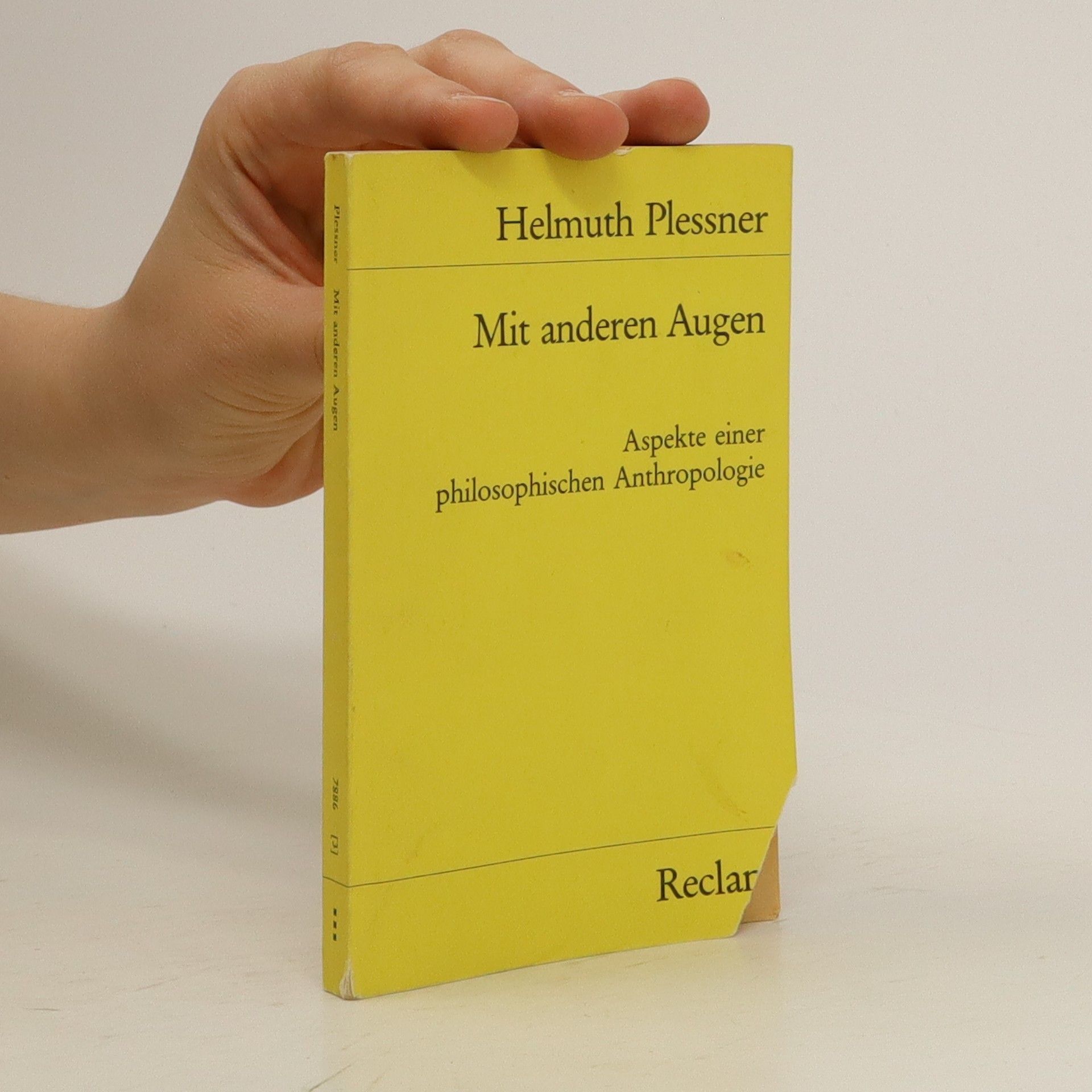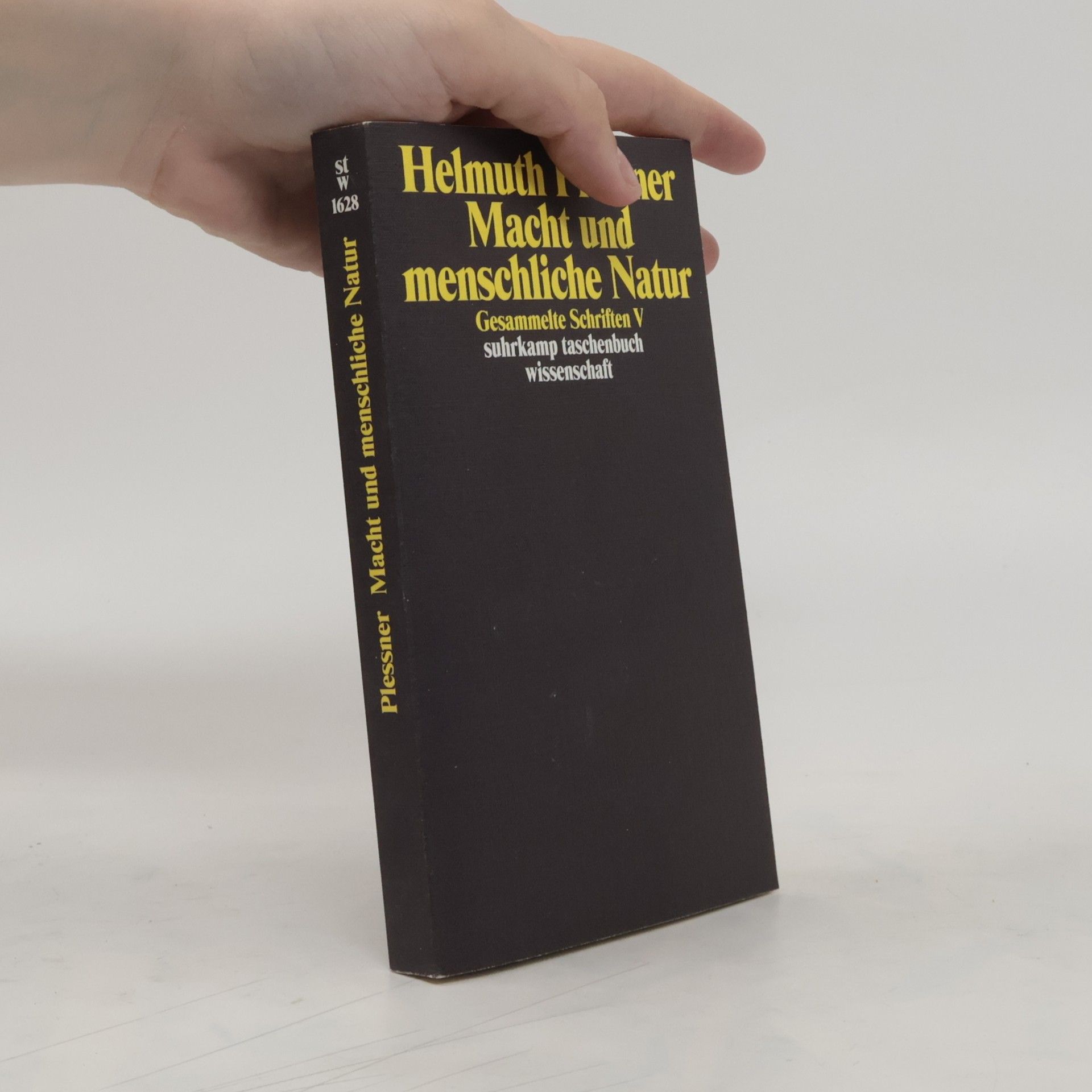Die verspätete Nation
- 195pages
- 7 heures de lecture
Hrsg. von Günter Dux, Odo Marquard und Elisabeth Ströker, 310 Seiten.
Helmuth Plessner était un philosophe et sociologue allemand, et un défenseur principal de "l'anthropologie philosophique". Son œuvre a exploré l'essence de l'existence humaine et la place de l'humanité dans le monde.






Hrsg. von Günter Dux, Odo Marquard und Elisabeth Ströker, 310 Seiten.
Predkladaná publikácia je prvým knižným prekladom Helmutha Plessnera do slovenčiny. V prvej eseji Moc a ľudská povaha sú prítomné základné východiská Plessnerovej antropologickej filozofie ako pozicionalita, teda spôsob umiestnenia človeka v prostredí, rozdiel medzi centrickou a excentrickou pozíciou človeka a spôsoby, akými človek dokáže prekročiť svoj vlastný stred. Po vzore filozofov existencie Jaspersa a Heideggera nie je Plessnerov človek nikdy hotovým výtvorom, ale neustálym procesom sebautvárania jednak počas vlastného života a potom aj na poli dejín, kde sa človek po vzore Diltheyovho historizmu stretáva so sebou samým. V druhej eseji Emancipácia moci sa jasne zrkadlí autorovo presvedčenie, že ak má mať filozofia či antropológia zmysel, musí byť politická. Podľa Plessnera sa človek vyznačuje biologicky danou potrebou moci, pričom predstava absolútnej moci zostáva pre jedincov rovnako neodolateľná tak v minulosti ako aj v súčasnosti. Moc sa podľa Plessnera v dejinách ľudstva nemení, menia sa len spôsoby jej uplatňovania.
Aus dem Inhalt: 1. Grenzen der Gemeinschaft. Eine Kritik des sozialen Radikalismus (1924) 2. Macht und menschliche Natur. Ein Versuch zur Anthropologie der geschichtlichen Weltansicht (1931) 3. Über das gegenwärtige Verhältnis zwischen Krieg und Frieden (1939/1949) 4. Die Emanzipation der Macht (1962) 5. Editorische Notiz schovat popis
Einleitung in die philosophische Anthropologie
Plessners Grenz-Schrift galt seit 1924 als Geheimtip. Entlang einer für deutsche Verhältnisse seltenen Limitierung von Gemeinschaftsutopien sucht sie durch die Denkfigur einer »Sehnsucht nach den Masken« ein »Gesellschaftsethos« zu begründen, das sich in den Kernkategorien »Distanz«. »Spiele, »Zeremonie und Prestige«, »Diplomatie und Takt« verdichtet. Wegen seiner jüdischen Herkunft 1933 zur Emigration gezwungen. entging Plessner in den Niederlanden während des Krieges nur knapp dem Zugriff der Gestapo. Nach 1945 spielte er als Remigrant neben Adorno, Horkheimer, Löwith und René König eine bedeutende Rolle in der intellektuellen Konsolidierung der bundesrepublikanischen öffentlichkeit.
Diese Edition macht erstmals einen Vorlesungszyklus aus Helmuth Plessners wissenschaftlichem Nachlass zugänglich. Das klar gegliederte Kolleg „Elemente der Metaphysik“ vermittelt in verständlicher Sprache die Grundzüge von Plessners Anthropologie, die er in seinem schwer rezipierbaren Hauptwerk von 1928 entwickelt hat, und stellt sie in einen umfassenden philosophischen Kontext. Die Vorlesung gliedert sich in drei Hauptteile: Im ersten Teil, der „Metaphysik des Bewußtseins“, zeigt Plessner, dass der klassische Ansatz der Bewusstseinsphilosophie zentrale metaphysische Fragen nicht beantworten kann. Die entscheidende Frage nach dem Sein des Bewusstseins bleibt im Rahmen der neuzeitlichen Philosophie, wie sie von Descartes entfaltet wurde, unbeantwortet. Plessner argumentiert, dass die Bewusstseinsphilosophie durch einen lebensphilosophischen Ansatz überwunden werden muss. Der zweite Teil („Metaphysik des Lebens“) konzentriert sich auf das Wesen des Lebens und das Verhältnis des Körpers zu seinen Grenzen, wobei der Begriff der „Positionaliät“ als zentraler Begriff seiner Biophilosophie hervorgehoben wird. Der letzte Teil („Der Mensch“) skizziert Plessners philosophische Anthropologie, in der der Mensch als Lebewesen mit „exzentrischer Positionalität“ definiert wird. Diese Vorlesung bietet eine leicht nachvollziehbare Einführung in Plessners Philosophie und enthält neue Inhalte, die unser Verständnis seiner Philosophie erweitern.